- Home
- Deborah Harkness
Time's Convert Page 14
Time's Convert Read online
Page 14
“’Pollo,” Philip said.
The griffin beat his wings once, twice, and rose up from the ground, as if he had been waiting for a summons.
Metal hit stone, landing with a peal that seemed to announce something momentous had happened.
I looked down, searching for what had made the noise. A tiny silver arrowhead lay at Philip’s feet, its edges sharp.
Once airborne, the griffin hovered by Philip’s head, attentive to his master’s next command.
“Pollo?” Sarah frowned. “Doesn’t that mean chicken?”
“Apollo.” Matthew looked at me in alarm. “The goddess Diana’s twin.”
* * *
—
BECCA AND PHILIP WERE PLAYING on the fluffy sheepskin in our bedroom, content for the moment with blocks, a truck, and a herd of plastic horses.
The griffin was confined to the pantry.
“I think the ghosts have been trying to warn me about Apollo for days, with their constant prowling around the mythology section,” I said, pouring myself a glass of wine. I didn’t usually drink during the day, but these were exceptional circumstances.
“How much do you know about the goddess Diana’s brother?” Matthew asked.
“Not much,” I admitted, examining the small silver arrowhead. “There was something in one of Philippe’s books about him. Something about three powers.”
A luminous green-and-gold smudge by the fireplace took shape and morphed into my dead father-in-law.
“Gamper!” Becca said, showing him a horse.
Philippe smiled at his granddaughter and waggled his fingers. Then his expression turned serious.
“Constat secundum Porphyrii librum, quem Solem appellavit, triplicem esse potestatem, et eundem esse Solem apud superos, Liberum patrem in terris,” he said.
“According to Porphyry’s book, where he is called Sol, his power is threefold, and the same as Sol in the sky, the Father of Freedom on earth.” I translated the Latin as fast as I could. Apparently, I had skirted some unwritten magical law by not asking a direct question and was going to be able to get the rarest of all treasures: information from a ghost.
“Porphyry?” Matthew looked impressed. “When did you memorize that?”
“I didn’t. Your father helped me.” I gestured toward the children. “He likes to watch over them.”
“Et Apollinem apud inferos.” Philippe’s attention was locked on his grandson.
“And Apollo in hell,” I said numbly. The arrowhead gleamed in the sunshine, illuminating the golden and black threads that tied it to the world.
“Unde etiam tria insignia circa eius simulacrum videmus: lyram, quae nobis caelestis harmoniae imaginem monstrat; grypem, quae eum etiam terrenum numen ostendit,” Philippe continued.
“Therefore, three attributes can also be seen in his representations: a lyre, which figures celestial harmony; a griffin, which shows that he also has a terrestrial power.” The words I spoke sounded like an incantation, their ancient meaning resonating through the room.
“Et sagittas, quibus infernus deus et noxius indicatur, unde etiam Apollo dictus est,” Philippe said.
“And arrows, by which are symbolized that he is an infernal god, and harmful, which is why he is called the destroyer.” My fingers closed around the silver arrowhead that the griffin had given Philip.
“That does it.” Matthew sprang to his feet. “I don’t care what it is or how much Philip likes having him for a pet. The griffin goes.”
“Goes where?” I shook my head. “I don’t think we have any choice, Matthew. The griffin obeys Philip, not you or me. Apollo is here for a reason.”
“If that reason has anything to do with destruction, or that arrow point it dropped on the floor, then the griffin can find another home.” Matthew shook his head. “My son is not going to be a plaything for the gods—or the goddesses. This is her fault. I know it.”
Matthew didn’t approve of the deal I’d made with the goddess to save his life in exchange for giving her the use of mine.
“Maybe we’re overreacting,” I said. “Maybe the griffin is just a harmless gift.”
“Nothing she does is harmless. What might the goddess give Rebecca when the time comes for her to make magic? A golden hind? A bear?” Matthew’s eyes were darkening with emotion. He shook his head. “No, Diana. I’m not having it.”
“You said yourself we can’t just pretend the twins don’t have magic in their blood,” I said, trying to be reasonable.
“Magic is one thing. Griffins and goddesses and hell and destruction—that’s something else entirely.” Matthew’s anger was rising. “Is that what you want for your son?
And the father of freedom on earth. Philippe’s voice was nothing but a whisper, his expression sad. Why is it always the dark with Matthew? Never the light.
It was a question Philippe had asked me before. There was no easy answer to it. Matthew’s faith, his blood rage, and his overactive conscience colored everything. It made his joy, his unexpected smiles, and his forgiveness all the more precious when he was able to rise above his darker feelings.
“Are you asking me to spellbind him?” I demanded.
Matthew looked shocked.
“Because that’s what it might take to raise Philip safely if he is a weaver and he doesn’t have Apollo to rely on,” I said. “Apollo can be with Philip even when we can’t. They’ll be a team.”
“Philip cannot take a griffin to school,” Matthew retorted. “New Haven is progressive, but there are limits.”
“Maybe not, but he can take a Labrador retriever. Provided it goes through the proper training program, of course, and gets certified,” I said, thinking aloud. “Apollo should make quite a convincing assistance dog, with the right disguising spell.”
“Not doggy, Mama,” Philip said, rocking his horse around the sheepskin in something vaguely like a gallop. “Griff’n.”
“Yes, Philip,” I said, giving him a weak smile.
My son had a pet griffin. My daughter relished the taste of blood.
I was beginning to understand why my parents might have thought spellbinding was a good option.
* * *
—
WHEN WE REJOINED THE REST of the family, they were settled out in the courtyard under a brightly colored umbrella, gathered around a table covered with snacks and beverages, talking a mile a minute. Apollo was with them.
“Yet you listened to my ancestor Sarah Bishop, and went back to Hadley as she told you to do,” Sarah was saying. “That took courage—giving up dreams of glory to look after your mother and sister.”
“It didn’t feel courageous at the time.” Marcus was cracking pistachio nuts at a furious pace, and throwing the shells on the ground for Apollo to peck at. “Some people accused me of cowardice.”
“Obviously they didn’t live with your father.” Sarah cut through any tension Marcus might be feeling with her usual combination of complete honesty and compassion.
I gave her shoulders a squeeze and sat down in front of the iced tea pitcher. My aunt looked up at me in surprise.
“Everything okay?” Sarah asked.
“Of course.” I poured myself some tea. “Matthew and I have been talking about what to do about Apollo.”
“He didn’t like being separated from Philip,” Agatha said.
“I’m not surprised.” Marcus ate a handful of pistachios. “The bond between a familiar and a weaver must be powerful. How’s Becca taking it?”
“She doesn’t seem at all jealous,” I replied thoughtfully.
“Give it time,” Marcus said with a laugh. “I imagine she’ll feel differently when Philip chooses to play with Apollo and not her.”
“Maybe Apollo is the familiar for both of them?” Matthew said hopefully.
“I don’t think it works that way,” I said, dashing hi
s hopes. He looked so forlorn that I gave him a kiss. “A familiar is a weaver’s training wheels, remember? Each one is different, and perfectly suited to the weaver’s talents.”
“So because Becca and Philip are fraternal twins, they’ll have different abilities, and therefore different familiars,” Marcus said. “Got it.”
“We still don’t know if Becca is a weaver, of course,” I reminded them.
Everybody looked at me with pity, as if I’d lost my mind.
I sighed. “Let’s look on the bright side. At least we’ll have some help keeping an eye on them.”
Matthew had consumed a full glass of wine by this point and was beginning to look less dazed.
“It’s true that Corra was quick to defend you if you were in danger,” Matthew said.
“And she was even quicker to come to my aid if I needed help or a bit of a magical boost,” I said, taking his hand in mine.
“Don’t you think it’s fascinating,” Agatha said, “that the power you possess comes with its own safety monitor? And in the form of a mythological creature, no less.”
“I’ve always wondered how weavers discovered they were different if there weren’t other weavers around to help them, and how they approached the problem of creating spells instead of just learning to work them the traditional way by studying grimoires and the practices of other witches,” Sarah said. “Now I know.”
“Dad had a heron,” I reminded her. “When I saw him in the past, I never thought to ask him how old he was when Bennu showed up.”
“It seems to me that familiars are a little like an inoculation,” Marcus said. “A bit of magic that prevents greater harm. Makes perfect sense.”
“Does it?” I was so used to thinking of Corra in bicycle terms that it was difficult to switch to a different metaphor.
“I think so. A familiar is like a childhood vaccine,” Marcus said. “With all this talk of 1775, I’ve been thinking a lot about inoculation. Apart from the war, it was the main topic of conversation in the colonies. Remembering Bunker Hill brought it all back to me.”
“Until the Declaration of Independence was signed, surely.” I felt on familiar historical footing now. “That had to have upstaged medicine.”
“No such luck, Professor Bishop.” Marcus laughed. “Do you know what they were celebrating in Boston on the fourth day of July in 1776? Not something happening in faraway Philadelphia, I can tell you that. The talk of the town—and the whole colony—was the Massachusetts legislature’s decision to lift the ban on smallpox inoculations.”
Even today, there was no effective treatment for this terrible disease. Once contracted, it was highly contagious and potentially fatal. The infection led to a high fever and pus-filled blisters that left disfiguring scars. Matthew had made sure I was vaccinated against it before we timewalked. I remembered the single blister that had erupted at the vaccination site. I would carry the mark for the rest of my days.
“We were more terrified of that silent killer than all the British guns,” Marcus continued. “There were rumors of infected blankets and sick people deliberately left behind when the British withdrew from Boston. Your ancestor Sarah Bishop warned me that surgeons were going to be as necessary as soldiers if we wanted to win the war. She was right.”
“So you trained to become a surgeon after Bunker Hill?” I asked.
“No. First I went home and faced my father,” Marcus said. “Then winter came, and with it there was a lull in the fighting. When the battles resumed in the summer, and soldiers gathered together again from all over the colonies, the number of smallpox cases rose until we were on the brink of an epidemic.
“We had nothing in our medicine chests that could fight it, and only one hope of surviving it,” Marcus continued.
He turned his left palm heavenward, revealing a round, white scar with a dimpled center on the underside of his forearm.
“We deliberately gave ourselves a mild case of smallpox to make us immune. It would be almost certain death if we contracted the disease through incidental exposure,” he explained. “Our independence from the king might have been celebrated in Philadelphia, but in Massachusetts we were simply glad to finally have a fighting chance at survival.”
Massachusetts Historical Society, Mercy Otis Warren Papers
Letter from Hannah Winthrop to Mercy Otis
Cambridge, Massachusetts
8 July 1776
(EXCERPT FROM PAGE 2)
The reigning Subject is the Small Pox. Boston has given up its Fears of an invasion & is busily employd in communicating the Infection. Straw beds & cribs are daily carted into the Town. That ever prevailing Passion of following the Fashion is as Predominant at this time as ever.
Men Women & children eagerly Crouding to innoculate is I think as modish, as running away from the Troops of a barbarous George was the last Year.
But ah my Friend I have not mentioned
the Loss I have met with which lies near my heart the death of
my dear Friend the good Madam Hancock, A powerfull
attachment to this life broken off, you who knew her worth can
Lament with me her departure. Ah the incertainty of all Terristrial happiness. Mr Winthrop joyns me Sincere regards to Coll Warren
& you, he hopes we shall be favord with his company with you & your son.
Yours in Affection
Hannah Winthrop
12
Pain
AUGUST–SEPTEMBER 1776
Zeb Pruitt returned to Hadley after the disastrous Quebec campaign and brought the smallpox with him. News of his infection spread through town with the fingers of August fog that were settling in the valley after the passing of the summer heat.
Anna Porter was flitting around her father’s mercantile like a self-important bumblebee. She enjoyed being in the hive of activity around the counter where people met to purchase newspapers, coffee, and flour—the three mainstays of the patriotic diet—and to exchange gossip. The store shelves were not as full of goods from abroad as they once were. The Porters could still find plenty of local suppliers of iron nails and cooking pots, saddles and shoes, and hog-bristle brushes, but there was no tea, little silver, and no porcelain. Writing paper was in short supply, and the few books available were from Boston and Philadelphia, not London. Spices and tobacco were now behind the counter, for fear that desperate shoppers might steal what little stock the Porters could acquire.
Today, Marcus was one of the few customers in the store. It was harvesttime, and much of the town’s male population was off fighting, which meant the women and children were in the fields. Marcus had earned some money doing necessary jobs around town to help out, and the coins were heavy in his pocket. He was leaning against the store counter, one foot resting on the lid to a butter churn, surveying the books and newspapers.
Marcus was seriously considering buying a copy of Common Sense. These days, everyone was talking about Thomas Paine. Marcus had participated in several heated discussions over his ideas in Pomeroy’s tavern, and read snatches of Paine’s work in the newspapers before Anna’s father shooed him away with complaints that he owned a store, not a library. Marcus had been transfixed by Paine’s simple yet powerful words about liberty, freedom, and the king’s obligations as father of the nation. He flipped to the chapter on hereditary succession that he had been studying the last time he was in the store.
For all men being originally equals, no ONE by BIRTH could have a right to set up his own family in perpetual preference to all others for ever, Marcus read, and though himself might deserve SOME decent degree of honors of his contemporaries, yet his descendants might be far too unworthy to inherit them.
Marcus’s eyes swept the shelves. Even with a war on, there were enough creature comforts in the Porter’s shop to keep the MacNeils happy and content for months. The contrast between all this abun
dance and the meager stores of food, cloth, and other essentials waiting for him at home was stark.
“Zeb’s face is monstrous,” Anna Porter said to Marcus in a low voice, trying to distract him from his reading. “If not for the color of his skin, you wouldn’t recognize him.”
Marcus looked up, a protest on his lips. But it died away before it was uttered, banished by Anna’s superior expression. Not everybody in Hadley admired Zeb’s irrepressible spirits and ingenuity as Marcus did.
“Is that so?” Marcus returned his attention to Mr. Paine’s pamphlet.
“Yes. Noah Cook says smallpox is destroying the army. He says they aren’t taking on any soldiers unless they can prove they’ve had the disease.”
Marcus hadn’t had the smallpox, nor had his father or Patience. Marcus’s mother was the only person in the household with immunity, since she was inoculated in Boston before she married Obadiah.
“They say Zeb is in Hatfield. At the old Marsh homestead.” Anna shuddered. “Zeb’s ghost will be next to haunt the place.”
“His ghost?” Marcus snorted. Ghost stories no longer frightened him. “And I suppose you believe old Mary Webster really was a witch.”
“Half-hanged Mary walks the riverbank on moonless nights,” Anna said, solemn as a judge. “My sister saw her.”
“Mary Webster was friendless and unlucky,” Marcus retorted, “but she was hardly immortal. I doubt very much that she is wandering around the boat landing, waiting for the ferry.”
“How do you know?” Anna demanded.
“Because I’ve seen dead men up close.” Marcus’s experiences at Bunker Hill were sufficient to even silence Anna—though not for long.
“I’m bored with Thomas Paine.” Anna’s lower lip extended in a pout. “It’s all anyone will talk about—that and the smallpox.”
“Paine is willing to say aloud what other men think but are afraid to utter.” Marcus went to the counter and left the price of the pamphlet with the clerk.
“Most people only buy a copy because they’re afraid someone might accuse them of being a Tory,” Anna said. Her eyes narrowed as she gauged how best to wound Marcus with her words. “Your cousin bought one. Just before he fled.”

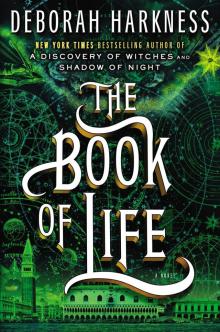 The Book of Life
The Book of Life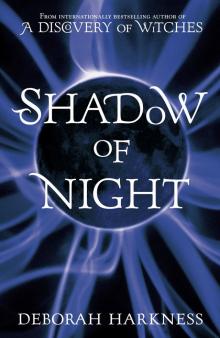 Shadow of Night
Shadow of Night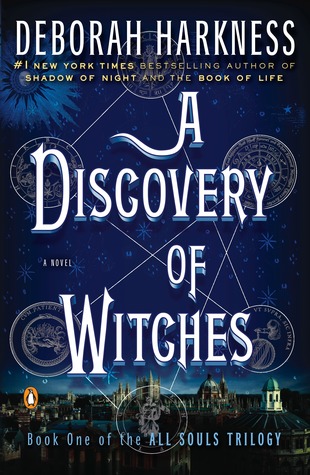 A Discovery of Witches
A Discovery of Witches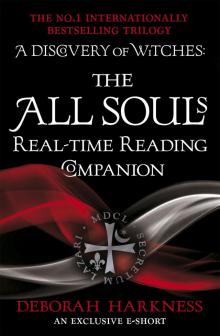 The All Souls Real-Time Reading Companion
The All Souls Real-Time Reading Companion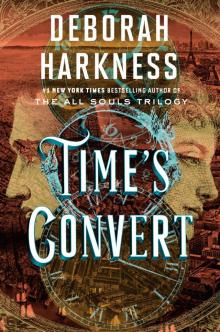 Time's Convert
Time's Convert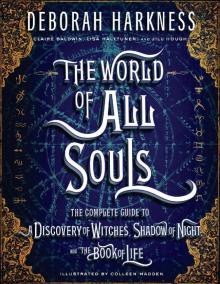 The World of All Souls
The World of All Souls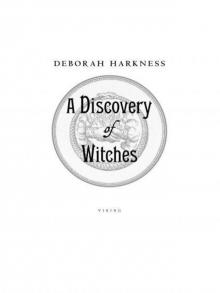 A Discovery of Witches: A Novel (All Souls Trilogy)
A Discovery of Witches: A Novel (All Souls Trilogy)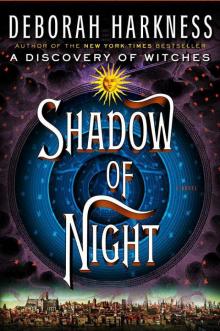 Shadow of Night: A Novel
Shadow of Night: A Novel